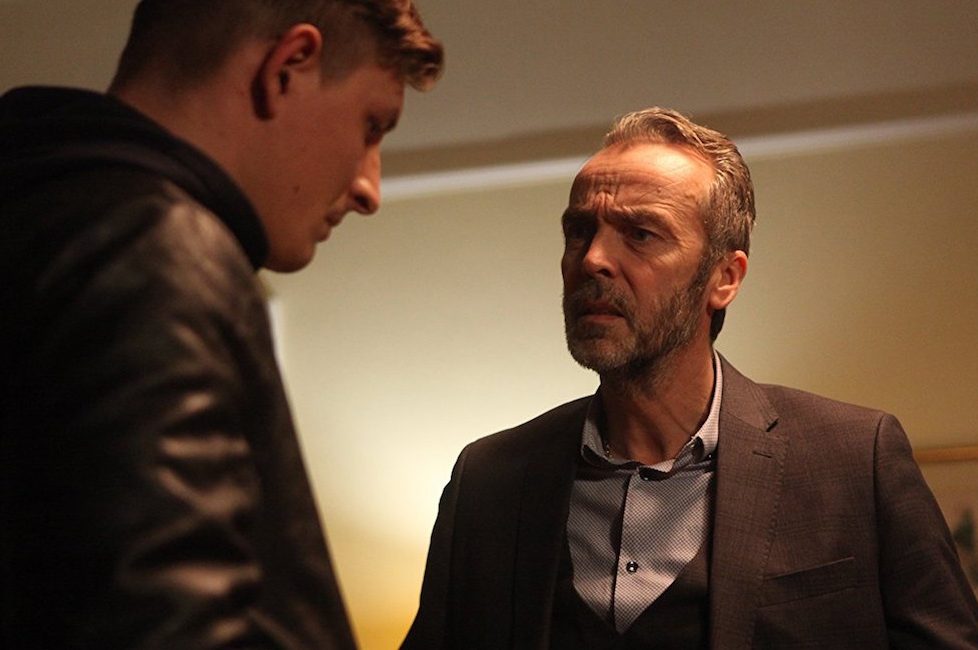THE MARKER (2017)
Noir thriller about a criminal seeking redemption by tracking down the daughter of the woman he killed, while being haunted by his guilt (represented by the woman's ghost)...

Noir thriller about a criminal seeking redemption by tracking down the daughter of the woman he killed, while being haunted by his guilt (represented by the woman's ghost)...


The Marker is a gritty British noir thriller that desperately wants to be more interesting than its contemporaries. Focusing on a bleak underworld, it’s filled with all the gangsters, violence, and associated clichés one might expect, but director Justin Edgar strives for more by introducing elements of psychological (or perhaps supernatural?) introspection. It’s all designed to give the film another flavour, but it doesn’t work, meaning The Marker falls victim to its genre’s most tedious conventions.
When enforcer Marley (Frederick Schmidt) inadvertently kills a woman during a debt collection, he’s sentenced to 7 years in jail for her murder, whereby he’s haunted by visions of her from beyond the grave. His victim becomes a constant presence during his incarceration, sitting quietly in the corner of his cell, or watching him from across the prison yard. Jump forward 6 years to Marley’s release, where he’s still being haunted by this spectre (a manifestation of his guilt, perhaps), and takes the ghost’s presence as a sign to protect her 16-year-old daughter Cristina (Lara Peake), who has become caught up in the affairs of Marley’s nefarious former employees, the Doyle brothers.
The Marker is reasonably well shot, but doesn’t feel particularly cinematic. Perhaps it’s something to do with shooting on location in Birmingham, as audiences are so conditioned to expect to see famous London locations in British movies. Or, more likely, it’s down to Edgar’s history of directing TV shows like daytime soap Doctors. The austere aesthetic (as grey as the concrete jungle of Birmingham) suits the mood of the film very well, lending everything a gritty and grim atmosphere. The performances are more of a mixed bag, however. John Hannah is colourful as gangster Brendan Doyle, but Schmidt struggles in the lead role of Marley. A man cut very much in the Tom Hardy mould, Schmidt can glower with the best of them, but when it comes to anything more overtly dramatic he resorts to bellowing at whoever’s in the same scene. It’s symptomatic of the film as a whole: it sort of looks the part, but lacks all subtlety.
The score is serviceable, and one moment even sees an acapella folk song take over the soundtrack, which suggests a more interesting film struggling to burst forth. Many of the bigger problems lie with the plot. Marley’s arc as a story of redemption is set up nicely, but too many of the plot points are painted broadly and can’t be taken very seriously. Is electro-shock therapy something they’d use on a troubled inmate in a modern British prison? Who knows–maybe it is?–but it’s glossed over so quickly that it feels like an unnecessary element.
The script generally feels ill-thought out. When Bernard asks Marley to go and find the missing Cristina, he states he can’t do it himself because she’d recognise him, suggesting that she somehow wouldn’t recognise the man that murdered her mother in front of her eyes? Oh, lease. The screenplay also seems to think that revealing the Doyle brothers as villains is something of a “twist”, despite the fact they’re very clearly baddies at first sight. By the time Marley ends up killing again, any investment you had in his muddled journey of redemption has long since vanished. That it suggests that particular murder is okay because his ghost-vision gives him “permission” really is the final straw. It’s hard to be invested in the redemption story of a murderer who doesn’t mend his ways.
Very little about The Marker rings true, and the underworld gangland clichés come thick and fast to the point where it becomes wearisome. The film isn’t totally without merit, as it’s great to have something shot in Birmingham, featuring a lot of authentic local talent, but it’s the sort of picture one might imagine a former boxer of footballer financing for themselves as a vanity project. With a better lead performance, even a story as unstable as this might have been more engaging when added to the effective atmosphere and the cool notion of personifying Marley’s guilt. Unfortunately, Schmidt doesn’t have the skill or subtlety to carry this role, and the script neglects to explore any of its more thought-provoking ideas.
It’s a shame, but The Marker rather misses the mark.
writer & director: Justin Edgar.
starring: Frederick Schmidt, Ana Ularu, John Hannah, Struan Rodger, Cathy Tyson & Lara Peake.
